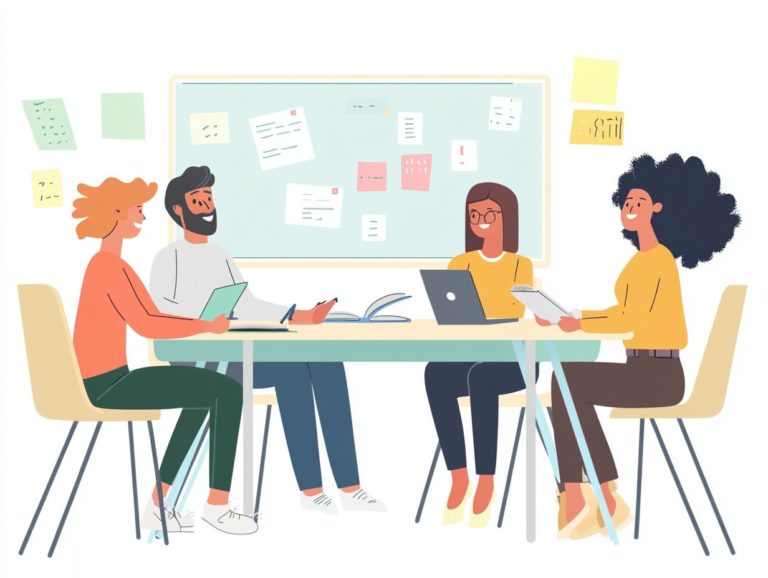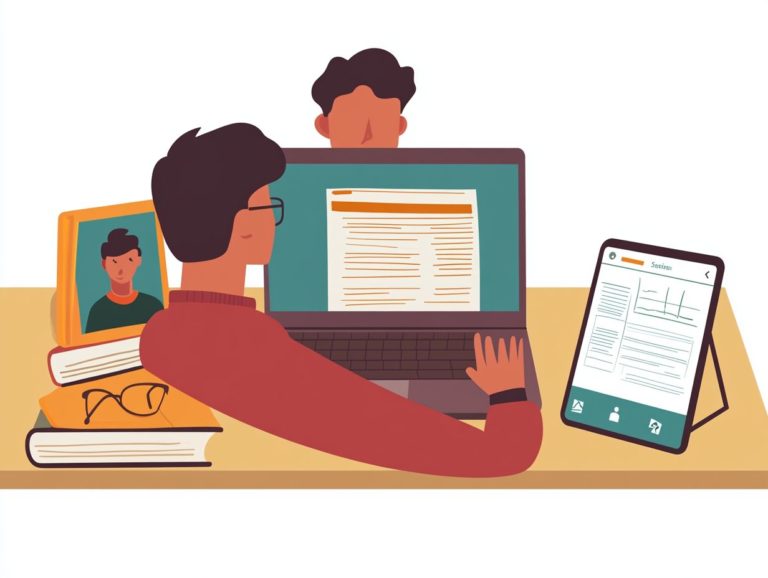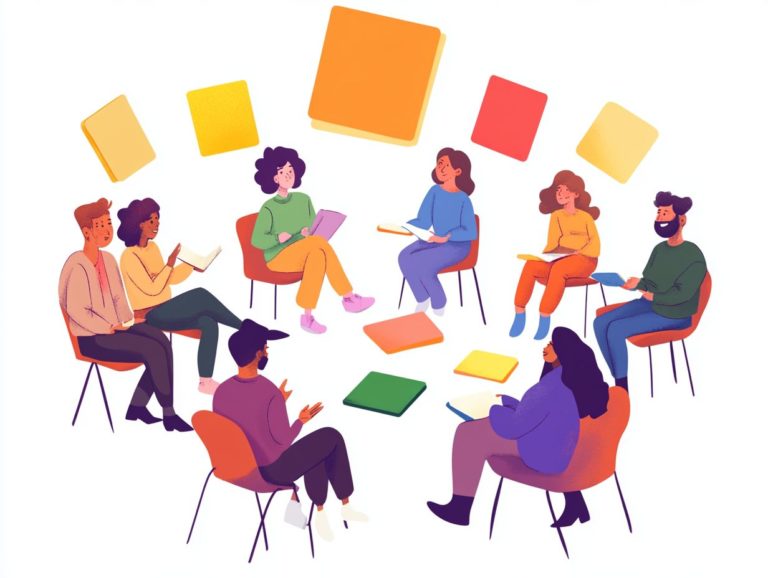7 essential tools for language learning
In today s interconnected world, mastering a new language can unlock a wealth of opportunities for you.
Whether you re just starting out or seeking to refine your existing skills, having the right tools at your disposal can significantly enhance your language learning journey.
This article delves into seven essential resources designed to elevate your experience, from engaging language learning apps to interactive exchange programs that foster real-world practice.
You ll discover how to seamlessly incorporate these tools into your daily routine, steer clear of common pitfalls, and maintain your motivation throughout the process.
Get ready to dive into your language adventure now! Let s dive in!
Contents
- Key Takeaways:
- 1. Language Learning Apps
- 2. Flashcards
- 3. Language Learning Podcasts
- 4. Online Language Courses
- 5. Language Exchange Programs
- 6. Textbooks and Workbooks
- 7. Language Learning Games
- How to Choose the Right Tools for Your Language Learning Journey?
- Frequently Asked Questions
- What are the 7 essential tools for language learning?
- How do textbooks help with language learning?
- What are some popular online resources for language learning?
- How can language exchange programs benefit language learners?
- Why are flashcards useful for language learning?
- What are some popular language learning apps?
- How can immersion programs help with language learning?
Key Takeaways:

Language learning apps offer convenience, game-like features, and a variety of resources.
Flashcards aid in memorizing vocabulary and grammar rules.
Podcasts provide immersive listening practice and cultural insights.
1. Language Learning Apps
Language learning apps have truly transformed the landscape of acquiring new languages. With interactive platforms like Duolingo, Babbel, and Memrise, you ll find tools that cater to your unique learning style and preferences.
These apps deliver a modern language learning experience that s accessible anytime and anywhere.
Each of these apps offers something distinctive. For instance, Duolingo keeps you engaged with its game-like features, rewarding you with points and levels that turn practice into a fun challenge rather than a tedious task.
Babbel, in contrast, tailors personalized study paths to align with your goals. This allows you to focus on topics that resonate most with you.
Meanwhile, Memrise shines when it comes to vocabulary acquisition. It employs a method that helps you remember information by reviewing it at increasing intervals and includes cultural immersion techniques that deepen your understanding of context and usage.
Collectively, these features not only elevate your learning journey but also pave the way to achieving conversational fluency, making you feel more connected to both the language and its rich culture.
2. Flashcards
Flashcards have proven to be an invaluable tool for vocabulary acquisition in your language journey. They allow you to reinforce your knowledge through spaced repetition and interactive study techniques that truly engage you.
Beyond vocabulary, flashcards also enhance your grammar and pronunciation. By pairing words with context and speaking them aloud, you improve retention and comprehension.
Modern digital flashcard tools and apps like Anki, Quizlet, and Memrise elevate your experience even further. These platforms incorporate multimedia elements think audio clips and images that cater to your unique learning style.
They also offer automated testing and performance analytics, enabling you to track your progress and focus on areas that need improvement.
This culminates in a more comprehensive and immersive learning adventure, giving you the power to master the language with confidence.
3. Language Learning Podcasts
Language learning podcasts present an engaging avenue for you to sharpen your listening skills and enhance your communication abilities. They are a critical resource for anyone striving for fluency and conversational prowess in their target language.
These audio gems span a variety of languages, featuring popular choices like Spanish, French, and Russian, each crafted to captivate and educate.
For example, Spanish-language podcasts often weave together real-life dialogues, cultural anecdotes, and interviews with native speakers. This allows you to grasp everyday usage and local expressions effortlessly.
In a similar vein, French podcasts immerse you in conversations that tackle contemporary issues while weaving in rich cultural narratives, ensuring the learning process feels dynamic and relevant.
In terms of Russian, you ll find engaging discussions paired with cultural insights, enriching your understanding of context and nuance essential elements for mastering the language.
With these diverse approaches, podcasts cultivate a lively environment where you can seamlessly absorb vocabulary and pronunciation in a natural, authentic manner.
Now that you’ve explored these essential tools for language learning, it’s time to take action! Choose the resources that resonate with you, including the best tools for tracking your language learning progress, and start your journey towards fluency today.
4. Online Language Courses
Online language courses offer a flexible and structured learning path. You can engage with language experts and access top-notch educational resources at your own pace. This makes self-directed learning not only achievable but genuinely enjoyable.
These platforms provide courses in popular languages such as Spanish, German, and Chinese, employing hands-on ways that enhance your real-world conversational skills.
For instance, you might find programs that include interactive video sessions and cultural assignments, enriching your comprehension and retention. With personalized study options, you can tailor your learning experience to meet your unique needs.
Whether you prefer fun games that make learning exciting, practical exercises, or collaborating with peers, you have the freedom to choose. This adaptability caters to diverse learning styles, giving you the power to decide how you want to engage with the language and its rich cultural nuances.
5. Language Exchange Programs
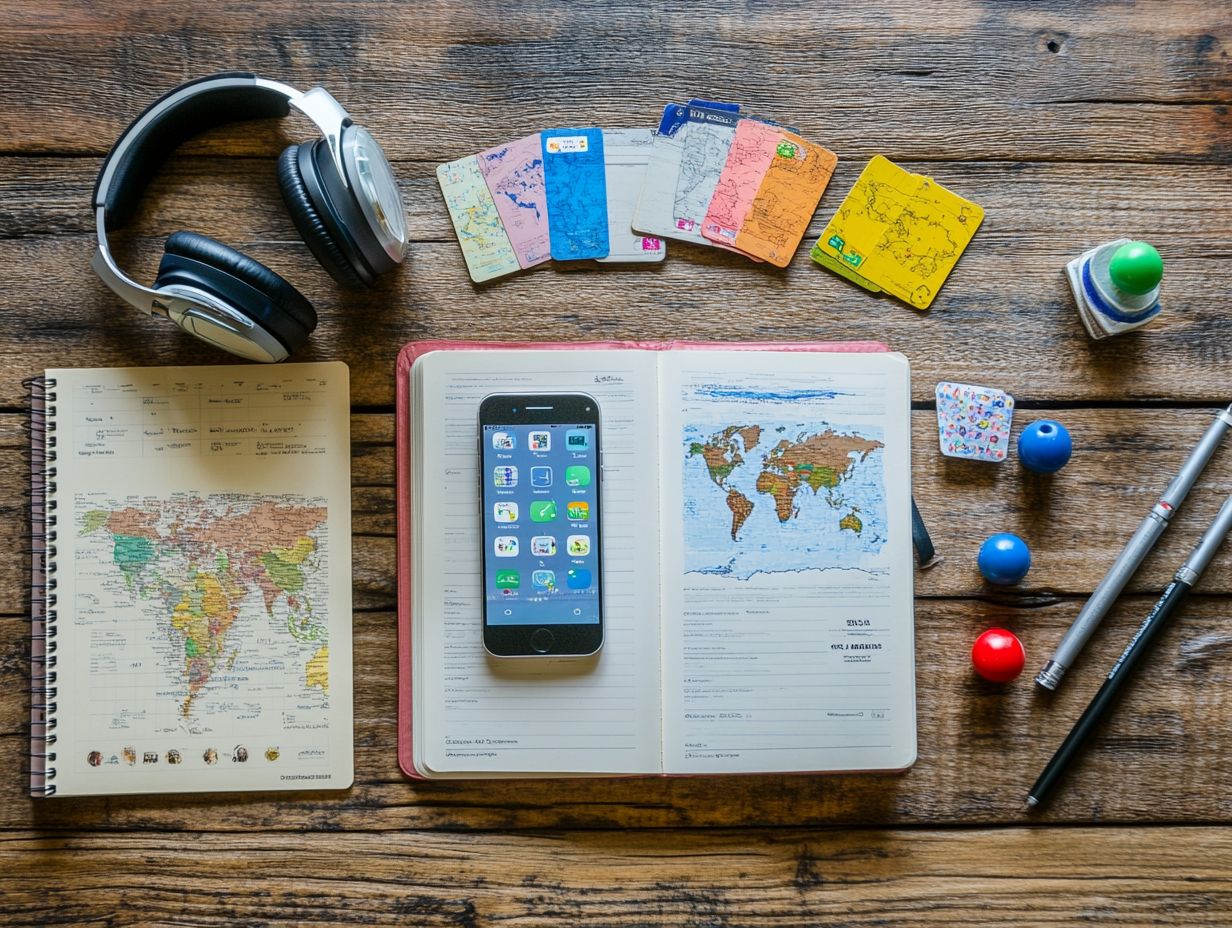
Language exchange programs offer you invaluable opportunities to practice speaking with native speakers. This elevates your communication skills while immersing you in diverse cultures and helping you forge connections within language communities.
Platforms like HelloTalk and Tandem provide a range of features including text, voice, and video chats that enable you to engage in genuine conversations.
By connecting you with individuals from around the globe, these platforms create a space where you can discuss everyday topics or delve into specific interests in detail. This not only hones your speaking proficiency but also enhances your comprehension through real-world interactions.
As you converse with partners who share your enthusiasm for language, you’ll find yourself navigating cultural nuances and idiomatic expressions. This makes your learning adventure not just productive, but thrilling!
6. Textbooks and Workbooks
Textbooks and workbooks remain essential tools in your language learning journey. However, exploring the best language learning tools for busy individuals can also offer structured lessons that focus on grammar, vocabulary, and pronunciation—key elements for establishing a robust language foundation.
These materials can act as a launchpad for you to delve deeper into the language, employing various learning techniques like repetition and contextual usage. While traditional resources provide the groundwork, they are increasingly complemented by digital platforms that elevate your learning experience through interactive exercises and multimedia content.
This blended approach fosters a more dynamic environment, enabling you to explore the language in diverse ways whether it s listening to podcasts or engaging in online discussions. Ultimately, this enriches your fluency and comprehension, preparing you for real-world conversations and interactions.
7. Language Learning Games
Language learning games provide an interactive and enjoyable avenue for reinforcing vocabulary acquisition and enhancing language immersion. This transforms the learning experience into something both fun and engaging for you, no matter your age.
These games come in a variety of formats, including mobile applications and online platforms, catering to your unique learning style and preferences. Some platforms employ gamification techniques, allowing you to earn points, badges, or levels, creating a motivating atmosphere that encourages regular practice.
Mobile apps often feature quizzes, flashcards, and real-life scenarios, enabling you to apply your skills in relevant contexts.
Multiplayer games promote social interaction, allowing you to communicate and collaborate with peers, which further solidifies your grasp of language concepts through active engagement.
This dynamic approach significantly enhances retention, making it far easier for you to remember and utilize new vocabulary in everyday situations.
Start exploring these exciting language learning tools today!
How to Choose the Right Tools for Your Language Learning Journey?
Choosing the right tools is essential for your language-learning success. To make the process enjoyable, consider exploring 7 ways to make language learning fun. Evaluate various resources and understand your unique learning style to find options that help track your progress.
Dive into user reviews for real-world insights about different platforms. Look for resources like vocabulary lists, grammar guides, and interactive exercises to enhance your experience.
Align your tools with personal goals, whether aiming for conversational fluency or academic proficiency. A well-rounded plan might include mobile apps, online courses, and best language learning tools for visual learners to keep learning engaging.
What Are the Advantages and Disadvantages of Each Tool?
Every language learning tool has its own pros and cons. To enhance your skills, consider exploring the best tools for language listening practice and weigh these factors to find what suits you best.
Apps often provide interactive exercises that keep you engaged. Online courses offer a structured approach with experienced instructors.
However, apps may lack depth in teaching complex grammar. On the other hand, online courses can feel too rigid for those who prefer a flexible pace.
Flashcards are great for quickly building vocabulary, but they may not give the context needed for real conversations.
By considering these aspects, you can navigate your learning journey more effectively and choose methods that resonate with you.
How Can You Incorporate These Tools into Your Daily Routine?
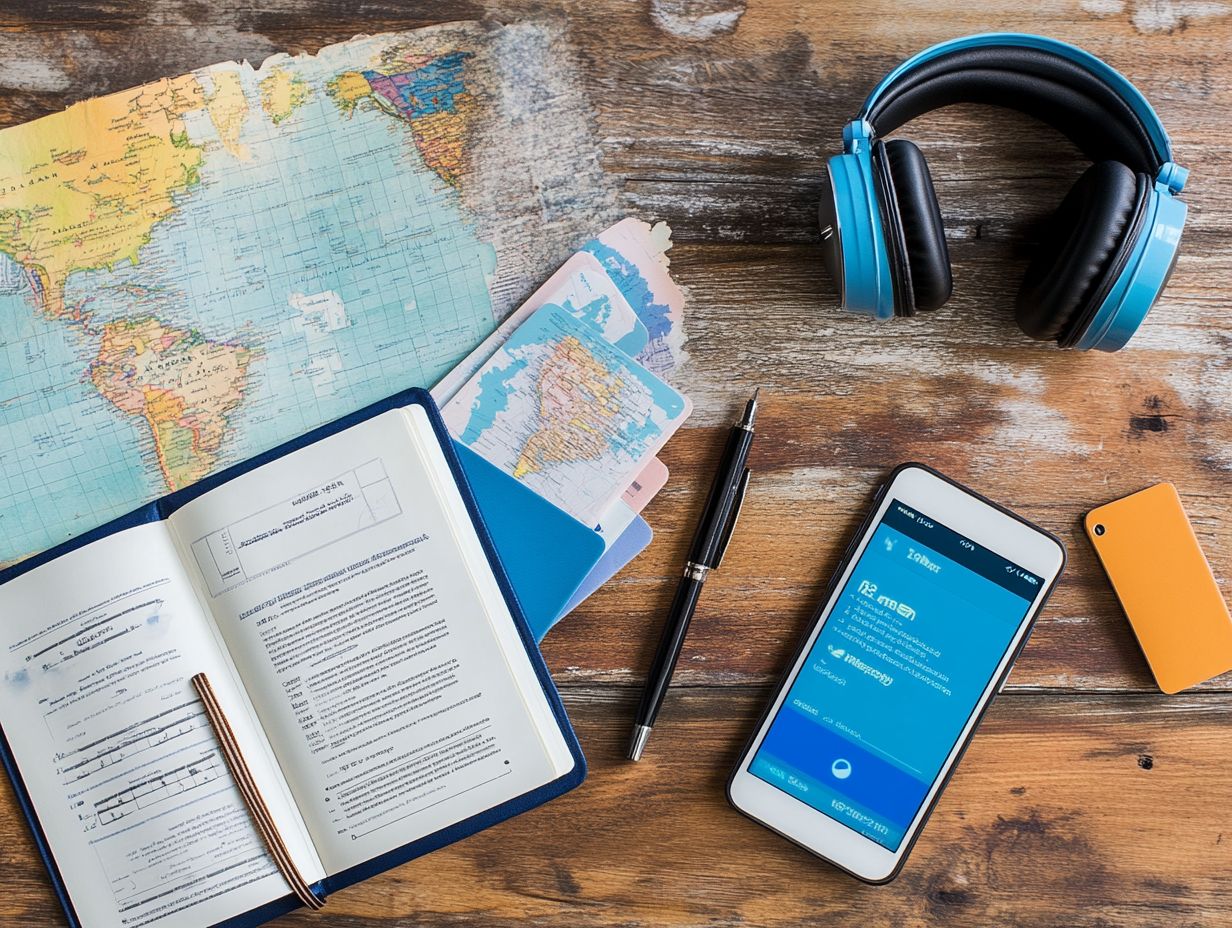
Incorporating language learning tools into your daily routine can significantly boost your self-directed learning. This strategy allows for consistent practice and gradual improvement.
Allocate specific times throughout your day for different resources. For instance, use a language app during your commute or while waiting for appointments to make the most of your time.
Listening to podcasts while doing chores or working out enables passive learning. You can also schedule flashcard review sessions during lunch breaks.
Set small, achievable goals like completing a lesson or learning ten new words each week to keep motivation high without feeling overwhelmed.
What Are the Common Mistakes to Avoid When Using These Tools?
Many learners stumble upon common pitfalls that hinder their progress. Avoid over-relying on a single app, as it limits your exposure to different contexts.
Neglecting speaking practice can also pose challenges. You might read and write well but struggle to speak the language fluently.
Another issue is the lack of consistent review sessions, which are key for memory retention. Diversifying your tools can create a more comprehensive learning experience.
Incorporate daily speaking exercises, such as language exchanges, to enhance fluency. Regularly revisiting what you’ve learned will help solidify your knowledge and build your confidence.
How Can You Measure Your Progress with These Tools?
Measuring your progress with language learning tools is crucial for understanding your fluency score and discovering how to make the most of language learning resources as you learn a new language.
To achieve this, you can employ various methods, including quizzes that assess your vocabulary and grammar comprehension. Speaking assessments can also evaluate your pronunciation and conversational skills.
Regular reviews are essential; they not only reinforce what you’ve learned but also highlight aspects that may need more focus.
Analyzing your assessment results gives you valuable insights into your strengths and weaknesses. This allows you to customize your study habits and strategies.
This adaptive approach ensures that your attention remains on personal growth, making your language learning experience both effective and engaging.
What Are Some Tips for Staying Motivated in Language Learning?
Staying motivated in language learning can feel tough, but it’s a rewarding adventure! By implementing effective techniques and setting achievable goals, you can significantly enhance your commitment and enjoyment throughout the process.
To cultivate a sense of community, consider joining language groups, whether in your local area or online. Engaging with fellow learners and native speakers can boost your passion.
Setting specific milestones like mastering basic conversational skills within a month or tackling chapter exercises weekly provides tangible achievements that help maintain your momentum.
Make learning fun with games and movies in your target language, or by taking part in cultural events. This creates a rich, immersive experience that transforms learning into something genuinely enjoyable.
By diversifying your methods of practice, you turn your journey into a delightful adventure rather than merely a tedious task.
Frequently Asked Questions
What are the 7 essential tools for language learning?
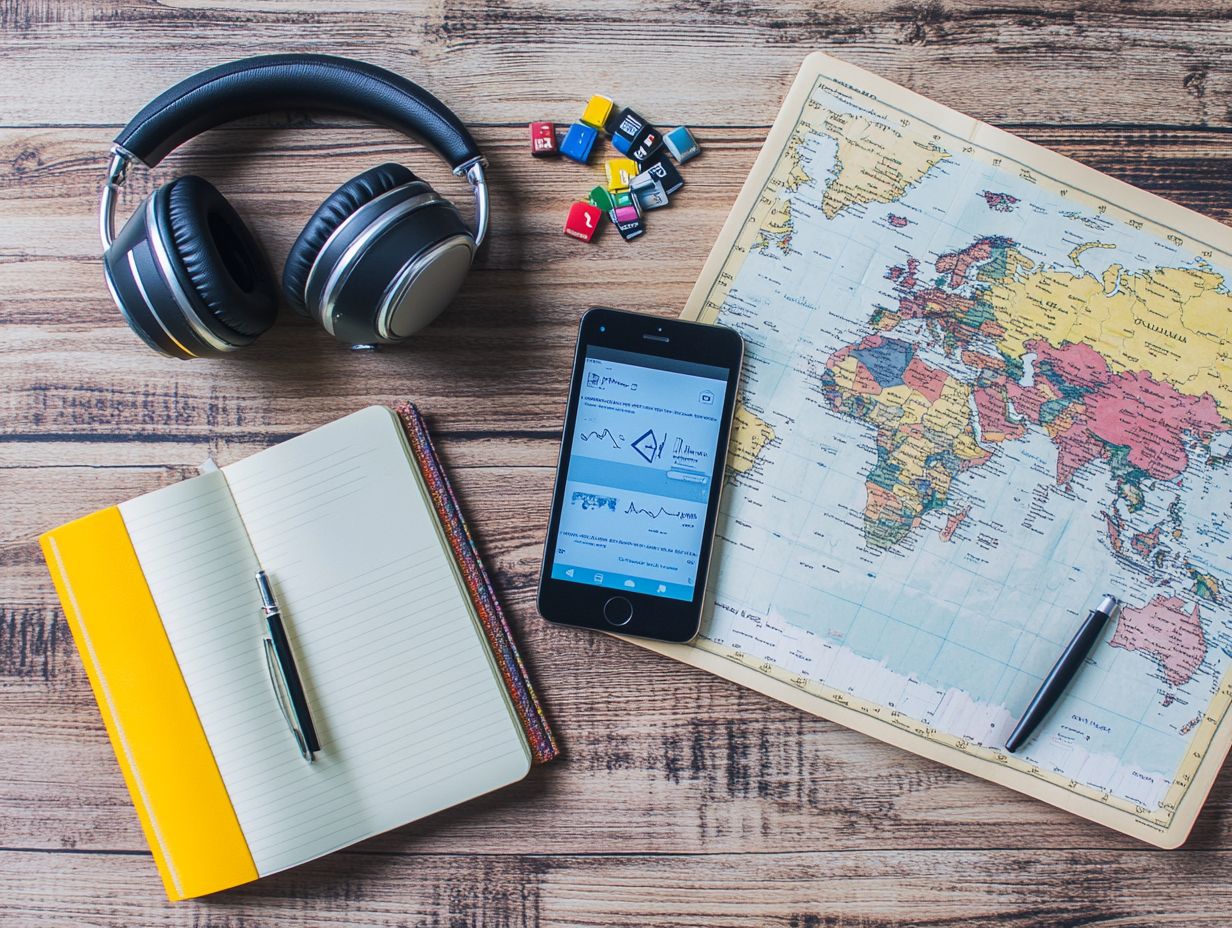
The 7 essential tools for language learning are: textbooks, online resources, language exchange programs, flashcards, language learning apps, immersion programs, and language tutors.
How do textbooks help with language learning?
Textbooks provide structured lessons and exercises to help you learn grammar, vocabulary, and sentence structures. They often include audio and visual aids to assist with comprehension and pronunciation.
What are some popular online resources for language learning?
Some popular online resources include Duolingo, Rosetta Stone, and Babbel. These websites and apps offer interactive lessons, games, and activities to help you practice and improve your language skills.
How can language exchange programs benefit language learners?
Language exchange programs allow you to connect with native speakers of the language you are learning. This gives you the opportunity to practice speaking and improve your conversational skills. It also helps you learn about the culture and customs associated with the language.
Why are flashcards useful for language learning?
Flashcards are a great tool for memorizing vocabulary words and phrases. You can create your own or use pre-made flashcards that focus on specific topics or themes in the language you are learning.
What are some popular language learning apps?
Some popular language learning apps include Memrise, Busuu, and HelloTalk. These apps offer a variety of features such as flashcards, interactive games, and social language exchange with native speakers.
How can immersion programs help with language learning?
Immersion programs provide a full immersion experience in the language you are learning by surrounding you with native speakers and offering opportunities for cultural immersion. This can enhance your fluency and understanding of the language.

